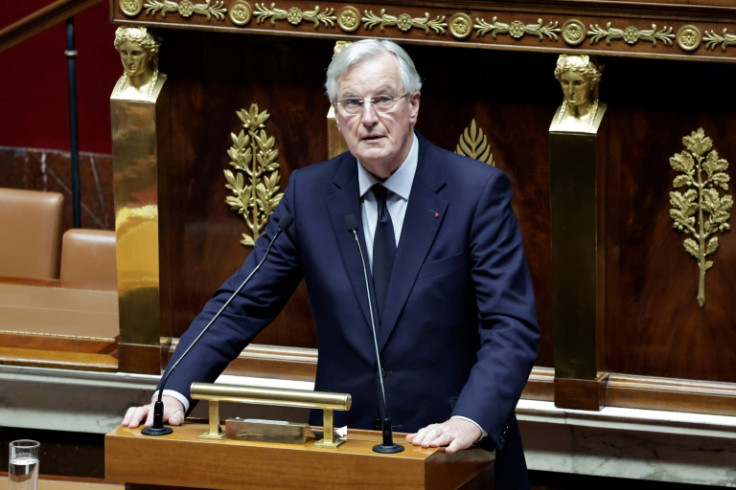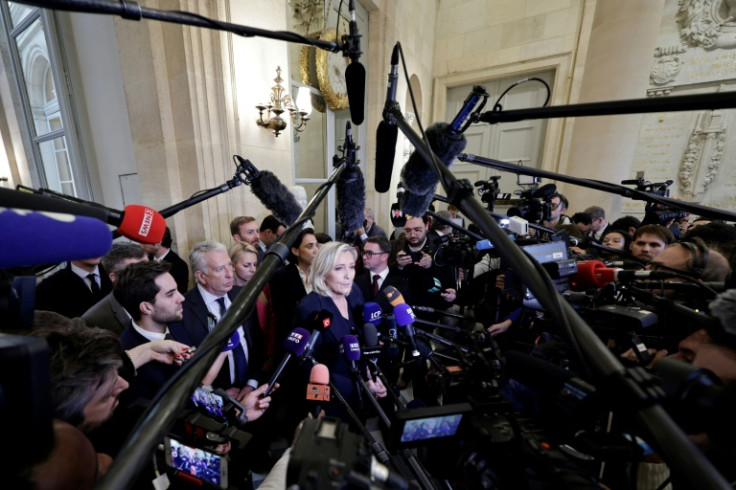French Government Risks Falling In No-confidence Vote

France's government on Wednesday faced no-confidence votes that could spell the end of the administration of Prime Minister Michel Barnier, plunging the country into uncharted waters of political chaos.
The toppling of the Barnier government after just three months in office would present President Emmanuel Macron with the unenviable choice of picking a viable successor with over two years of his presidential term left.
The National Assembly is due to debate two motions brought by the hard left and the far right in a standoff over next year's austerity budget, which saw the premier on Monday force through a social security financing bill without a vote.
The motion brought by the far-right National Rally (RN) of three-time presidential candidate Marine Le Pen is expected to be rejected.
But Le Pen has said her forces will back the left's motion, giving it enough numbers to pass in an evening vote that could topple a French government for the first time in more than 60 years.
Barnier said in a television interview late Tuesday that he believed his government could still survive.
"I want this and it is possible," Barnier said. "I think it is possible that there is this reflex of responsibility where -- beyond political differences, divergences, the normal contradictions in a democracy -- we tell ourselves that there is a higher interest."
He offered no last-minute concessions to break the deadlock and accused Le Pen of "trying to get into a kind of bidding war" in their talks.
The turmoil follows a snap parliamentary election called by Macron in the summer that aimed, without success, to halt the march of the far right.
The result left the RN as the largest single party in the lower-house National Assembly but with no faction holding a majority.
Barnier took office with Le Pen's party holding a sword of Damocles over his head, since it could topple the administration at nearly any point of its choosing.
No new elections can be called within a year of last summer's vote, narrowing Macron's options.
Some have suggested the president, who is wrapping up a state visit to Saudi Arabia, should resign to break the impasse.
But Macron rejected those calls, saying such a scenario amounted to "political fiction".
"It's frankly not up to scratch to say these things," Macron told reporters.
But with markets nervous and France also bracing for strikes by public-sector workers on Thursday that will see many schools shut nationwide and flights cancelled, there is a growing sense of crisis.
"Is France now Greece on the Seine?" asked American daily The Wall Street Journal, referring to the Mediterranean nation's 2007-2008 debt crisis that rocked the European Union.
"His failure," headlined the left-wing daily Liberation on its front page with a picture of Macron, who is due to serve until 2027.
Six months after calling the elections, Macron's "position had never been so fragile", it added.
The head of the Socialist party, Olivier Faure, called on Macron to make his intentions clear should the Barnier government fall.
"Rather than dropping little remarks during a visit to Saudi Arabia, Emmanuel Macron now needs to speak to the French people," Faure told Le Monde daily in remarks published Wednesday.
"How can he leave the French people in this uncertainty just before Christmas?"
Candidates for the hot seat as premier are few and far between, with loyalist Defence Minister Sebastien Lecornu and Macron's centrist ally Francois Bayrou possible contenders.
From the left, he could turn to former Socialist premier and interior minister Bernard Cazeneuve, a contender in September.
If the government falls, it would be the first successful no-confidence vote since a defeat for Georges Pompidou's government in 1962, when Charles de Gaulle was president.
The lifespan of Barnier's government would also be the shortest of any administration of the Fifth Republic, which began in 1958.
Some observers have suggested that Le Pen, 56, is seeking to bring down Macron before his term ends by ousting Barnier.
Le Pen is also embroiled in a high-profile embezzlement trial. If found guilty in March, she could be blocked from participating in France's next presidential election.
She has insisted, however, that the standoff with Barnier is entirely about a budget that she said would make the French poorer.
By following the "catastrophic continuity of Emmanuel Macron", the prime minister "could only fail", she wrote on social media.


© Copyright AFP 2026. All rights reserved.





















